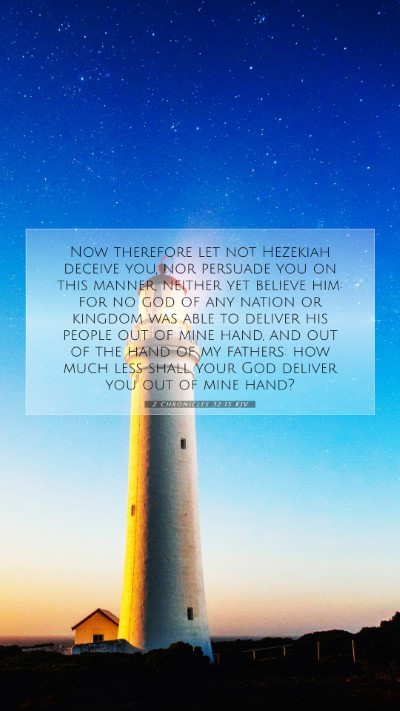Bible Verse Meaning: 2 Chronicles 32:15
Verse: "Now therefore let not Hezekiah deceive you, nor persuade you on this manner, neither yet believe him: for no god of any nation or kingdom was able to deliver his people out of mine hand, and out of the hand of my fathers: how much less shall your God deliver you out of mine hand?"
Summary of 2 Chronicles 32:15
This verse captures the bold defiance of the Assyrian king Sennacherib against King Hezekiah and the God of Israel. The context reveals a time of great distress for the people of Judah as they face the might of Assyria. Sennacherib’s taunt underscores the power dynamics of the ancient world, where earthly kings often boasted of their army's superiority over the gods of their enemies.
Commentary Insights
-
Matthew Henry:
Matthew Henry emphasizes the human tendency to rely on worldly strength rather than faith in God. He paints Sennacherib as the archetype of arrogance, showcasing how the might of earthly kings can lead to a false sense of security. His challenge to the God of Israel signifies a spiritual battle, calling believers to recognize that genuine deliverance comes from God alone.
-
Albert Barnes:
Albert Barnes provides an analytical approach, noting that Sennacherib’s words reflect a broader truth about all nations. He argues that the king’s misjudgment stems from underestimating the power of God. Barnes encourages readers to see this as a lesson in the futility of placing confidence in human strength and the importance of faith in divine sovereignty.
-
Adam Clarke:
Adam Clarke expands on the historical context and the psychological warfare employed by Sennacherib. Clarke argues that such rhetoric aims to demoralize and incite fear amongst the people of Judah. He stresses the need for spiritual fortitude and reliance on the promises of God, who stands ready to defend His people against their adversaries.
Understanding the Context
The verse is set during a period of siege and despair. The Assyrian Empire, noted for its military prowess, threatens Jerusalem. Hezekiah, the righteous king of Judah, has been fortifying the city and seeking divine help. Sennacherib's mocking challenge directly addresses the faith of Hezekiah and the people, testing their reliance on God amidst intimidation.
Application in Daily Life
2 Chronicles 32:15 serves as a powerful reminder about the importance of unwavering faith. In times of distress—be it personal struggles, societal issues, or spiritual battles—this verse prompts believers to stand firm against the pressures of the world. It underscores the truth that God is not limited by our circumstances and can deliver us, even when all seems lost.
Cross References
- Isaiah 36:18-20: A parallel account of the Assyrian threats to Jerusalem.
- 2 Kings 18:30-32: The same taunt from Sennacherib, illustrating his arrogance.
- Psalm 20:7: A declaration that some trust in chariots and others in horses, but we trust in the name of the Lord.
- Isaiah 37:10-11: God’s assurance to Hezekiah in response to Sennacherib’s arrogance.
Further Study and Reflection
Understanding this scripture can enrich your Bible study experience. Consider joining bible study groups or utilizing bible study tools to analyze the depth of such passages. This verse challenges us to reflect on our own faith in God when faced with difficulties.
Conclusion
In summary, 2 Chronicles 32:15 stands as a testament to the might of God versus human power. Remember, during trials, maintain faith and seek understanding through scripture. This verse, among many others, serves to bolster the resolve of believers and categorically refutes the notion that God is powerless in the face of overwhelming odds.


